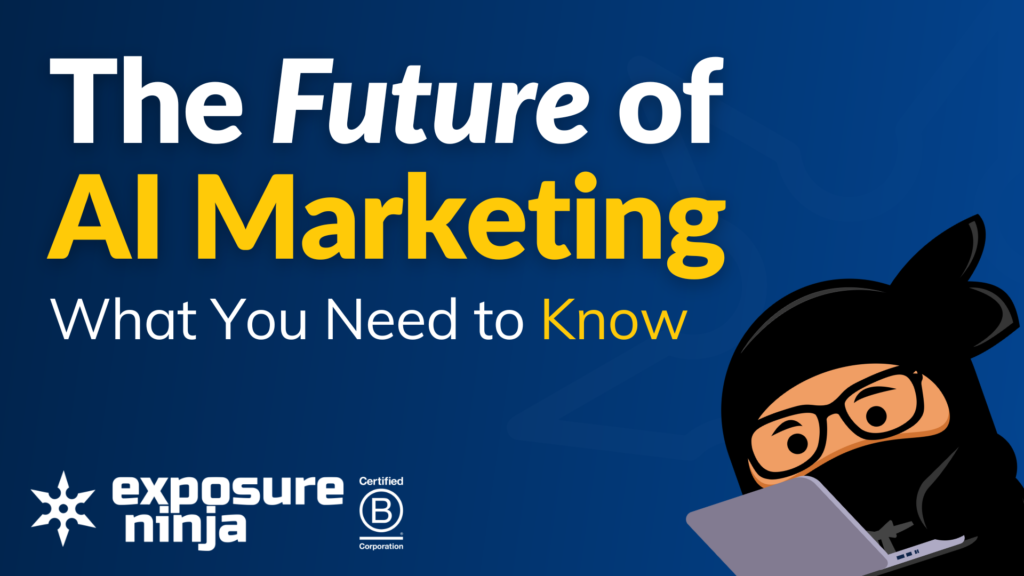
Get Weekly Marketing Tips
Join 30,000+ marketers and get the best marketing tips every week in your inbox
Look around. You’ll notice something happening in your Google Analytics – organic traffic from traditional search might be slipping. But here’s what’s really interesting: ChatGPT mentions are probably showing up in your referral sources. Welcome to the next evolution of search.
We’re seeing a fundamental shift in how people find information online. Google’s UK users have dropped year-over-year for the first time ever – and that’s before ChatGPT even had web search capabilities. But this isn’t just about ChatGPT vs Google. We’re entering an era where AI doesn’t just find information – it interprets, recommends, and sells on your behalf.
The Battle for Visibility Has Changed
Remember when getting to the top of Google was enough? Those days are numbered. Google’s AI Overviews are now used by over a billion people worldwide. ChatGPT is crushing Bing’s market share since launch. AI tools are becoming the default way people research products and services. Even Google’s regular search results are now heavily influenced by AI.
But here’s the real kicker: if you’re not optimising for this shift, you’re about to lose big. Just ask Unbounce – they went from owning the featured snippet for ‘how to improve sales conversion rate’ to being buried beneath AI-generated content. Their traffic? Decimated.
The good news? This isn’t the end. It’s an opportunity to dominate – if you know how to play the game.
Is your marketing underperforming?
Request a free website and marketing review and our team will tell you how to improve your marketing.


Your Secret Weapon: The GEO Game Plan
Generative Engine Optimisation (GEO) is your key to winning in this new landscape. But forget everything you know about traditional SEO – we need to go deeper.
Think about it: when you optimise for traditional search, you’re trying to rank a webpage. When you optimise for generative AI, you’re teaching AI tools how to sell your business. It’s not just about being found anymore – it’s about controlling the narrative that AI tells about your brand.
The shift is seismic. Where traditional SEO aims to rank pages that answer questions, AI tools want to answer questions directly. Your content isn’t just competing for visibility – it’s teaching machines how to recommend you. Your brand positioning needs to be crystal clear, and your authority needs to be unquestionable. Every piece of content you publish is training AI on how to represent your business.
Most marketers are still catching up. At the recent B2B Marketing Show in London, we heard the same story repeatedly from marketing managers: their bosses are playing with ChatGPT all day and demanding to know how to get ranked on it. While they’re still figuring out what questions to ask, you’re about to learn how to dominate this space.
The hard truth? If you’re not preparing for this shift, your competitors will be.
We’ve already seen businesses lose 30-35% of their traffic overnight when AI Overviews pushed them down the page. But this isn’t just a story of loss – it’s an opportunity for massive gains.
We’re seeing businesses use GEO to leapfrog competitors who rank above the classic first position. They’re getting featured prominently in AI-generated answers and turning informational searches directly into sales. Some have built such strong AI recommendations that they’re seeing consistent traffic from sources that didn’t even exist six months ago.
The future of search isn’t coming – it’s here. And you’re about to learn exactly how to dominate it.
Phase 1: Build Your Foundation (SEO Benchmarking)
Before you can dominate in AI search, you need to understand a crucial truth: most AI tools (except Claude) do background web searches before generating answers. This means your traditional SEO foundation needs to be rock-solid.
You still need strong rankings in Google, Bing, and Brave. Traditional SEO isn’t dead – it’s your launchpad for GEO success. Technical optimisation matters more than ever, because AI tools are even more sensitive to structure and clarity than traditional search engines.
Take Perplexity’s search for ‘best CRMs for software businesses’. Before giving an answer, it runs background searches for terms like ‘Best CRM software businesses 2024‘ and ‘Top CRM software for tech companies 2024‘. If you’re not visible in these underlying searches, you won’t even get a chance to be recommended.
Phase 2: Secure Key Territory (AI Overview Optimisation)
With a billion users worldwide, Google’s AI Overviews represent your primary battleground. Success here requires understanding three key areas:
First, identify your battlegrounds. Different industries trigger AI Overviews differently. Finance and medical queries tend to be more conservative, often limiting AI responses to definitions. But most businesses have significant opportunities, particularly with informational queries.
Next, master content formatting. AI Overviews prefer content that corroborates their generated answers. High readability scores aren’t just nice to have – they’re essential. Your content structure needs crystal-clear headings and a logical flow that AI can easily parse.
Finally, track your visibility. Tools like SE Ranking and Semrush (you can get a free trial using our affiliated partner link: thankyouninjas.com) offer AI Overview monitoring, but remember – these results are more dynamic than traditional rankings. What works today might need tweaking tomorrow.
Phase 3: Intelligence Gathering (AI Sentiment Analysis)
This is where things get fascinating.
AI tools aren’t just searching – they’re forming opinions about your business that influence their recommendations.
When we ask Claude (which doesn’t even have internet access) about the best value skincare brands, it recommends The Ordinary. Why? Because its training data associates the brand with ‘high quality’ and ‘good value’. That’s the power of strong AI sentiment.
You need to understand what AI tools ‘know’ about your business. Are they accurately representing your services? What do they think about your pricing and quality? How do they compare you to competitors? Most importantly, what misconceptions need correcting?
This isn’t just about correcting errors – it’s about controlling your narrative. We recently discovered an AI tool thought one of our clients had ‘high client volume’ and therefore ‘less personalised service’. That wasn’t true – but it was costing them recommendations. A targeted content strategy fixed that perception.
Your Battle Plan for 2025
Month 1: Solidify Your Foundations with Quick Wins
This month is all about ensuring your site’s technical and tracking basics are in excellent shape. By the end of Month 1, you’ll have ironed out any technical issues that could prevent both traditional and AI-driven search visibility. You’ll likely see modest but positive shifts in performance—faster loading times, more accurate analytics, and early signs of improved ranking stability—forming a strong platform for all the steps ahead.
Actions:
- Technical SEO Checks: Improve site speed, fix any crawling or indexing issues, and ensure mobile responsiveness.
- Core Web Vitals Optimisation: Enhance page load times and interactivity to meet Google’s standards.
- Analytics & Tracking Setup: Verify that conversions from both organic and AI referral sources are correctly recorded.
Month 2: Elevate Your Content for AI Overviews
With your technical foundations set, this month you’ll focus on content clarity and structure. Your efforts will start to pay off as AI tools find it easier to integrate your pages into their responses. You should begin appearing more frequently in AI-driven summaries, increasing your reach to potential customers early in their research journeys.
Actions:
- AI-Friendly Content Formatting: Add headings, bullet points, and concise summaries, making your content easily digestible by generative AI.
- Schema Mark-up & Structured Data: Implement structured data (e.g. product schema, review schema) to help AI tools represent your offerings accurately.
- Content Gap Filling: Identify and produce content on topics AI-driven users are searching for but which you currently lack.
Month 3: Reinforce Authority & Brand Positioning
Having laid the technical and content groundwork, this month you’ll strengthen your brand’s authority signals. Featuring in industry publications and gathering positive reviews will help shape how AI models describe you. By Month 3’s end, you should see your brand’s name emerging in AI-powered “best of” lists, recommendations, and expert overviews, ultimately attracting more high-quality leads.
Actions:
- Digital PR & Quality Mentions: Secure coverage in reputable industry outlets to influence how AI tools perceive and recommend you.
- Automated Review Collection: Systematically gather and highlight genuine customer feedback, reinforcing positive brand sentiment.
- Sentiment Corrections: Address misconceptions in AI outputs by clarifying your messaging across your site and external platforms.
Month 4 and Beyond: Ongoing Dominance & Adaptation
By now, you’ll have seen tangible improvements in AI-driven visibility, with more direct referrals and higher-quality enquiries. Your brand stands out as an authority, and you’re well-positioned to adapt to future changes. Moving forward, your focus shifts to advanced content—unique data, thought leadership, richer media—and continuous refinement. This sustained effort ensures that as AI tools evolve, your brand remains a go-to recommendation.
Actions:
- Expanded Content Coverage: Publish proprietary research, data comparisons, and expert insights to stand out in AI-generated answers.
- Thought Leadership: Strengthen your brand narrative through authoritative blog posts, whitepapers, videos, or webinars.
- Continuous Optimisation: Monitor AI platform updates (e.g. Gemini 2.0) and refine your strategy to stay ahead of competitors.
By following these steps each month—strengthening foundations, optimising content for AI overviews, building brand authority, and continually adapting—you’ll secure lasting dominance in the next era of search.
The Future Is Here
Want to dominate in this new landscape? You have two options:
- Get our comprehensive GEO Game Plan – we’ll build you a complete strategy for dominating in AI search
- Request a free website and marketing review – see how your current setup measures up
The next marketing battleground is here. The only question is: are you ready to dominate?
Want to learn more about mastering AI search? Check out our in-depth guides:
Or watch one of these videos:


















